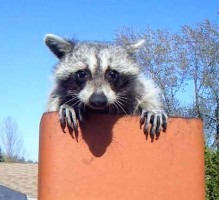A team of officers will drop rabies vaccine baits in farmland, greenspaces and ravines in Hamilton after a raccoon tested positive for the disease, the first confirmed case of rabbies in Ontario in nearly a decade.
The Ministry of Natural Resources is moving quickly to try to contain the spread of the disease. It began by baiting wild animals by hand in the Stoney Creek area Monday. MNR staff are working within a four-kilometre radius of where rabies was discovered after two dogs got into a fight with a rabid raccoon inside an animal control van.
Officials will also drop aerial baits by helicopter on Wednesday, said Dr. Jessica Hopkins, Hamilton’s associate medical officer of health, at a board of health meeting on Monday.
“The bait packets, which are about the size of a toonie, contain vaccine to prevent the spread of rabies. This is really all in an effort to make sure that rabies does not get established in wild animals in Hamilton,” she said.
So how does a rabid raccoon get to southern Ontario?
“More than likely, it hitched a ride in a transport truck from the U.S.,” wildlife control expert Bill Dowd told CBC News.
“Raccoons have been known to be great hitchhikers,” said Dowd, the CEO of Skedaddle Humane Wildlife Control.
“We’re breaking new ground here because raccoon rabies had been very successfully contained,” he said.
Dowd says residents should be especially careful around any raccoon that is acting strange or aggressive, or doesn’t seem afraid of a nearby human.
If you hear noises in your attic or chimney call a professional, he added, because raccoons are seeking winter den sites right about now, he said.
“If you’re hearing any noises, call a professional to get the removed,” he said.
If you think you have a raccoon problem, call Skedaddle Humane Wildlife Control today. 1-888-592-0387. Proudly serving: Ottawa, Montreal, Halifax, Hamilton, Burlington, Oakville, Mississauga, Brampton, Kitchener-Waterloo, Guelph, Cambridge and the Niagara Region.



